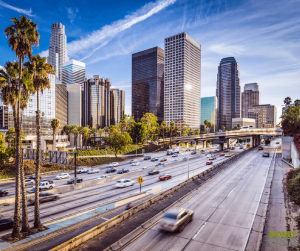
The city’s economy has grown exponentially over the years, thanks in part to a population of more than 10 million people churning out gross domestic product of nearly $700 billion. The companies that call LA home span widely in industry and size, but there is a notable wind of creativity, innovation, and diversity throughout.
How Does the LA Economy Compare to the Nation?
In recent years, LA’s economy has been reported as one of the world’s largest, falling closely behind New York City, but beating Norway, Taiwan, and Belgium based on total GDP. Exports have always played a role in how well LA’s economy thrives each and every year, and a concentration of manufacturing jobs lends a hand as well. When compared to the broader economic state of the nation, LA continues to stand out given its unique mix of industries and its rich population.
Industries that Contribute to LA’s Economy
Most people know LA as the entertainment capital of the world, but some may be surprised to learn that a number of widely varied businesses call the city home and contribute to its growing economy. Business services, education, hospitality and tourism top the list of business sectors flourishing throughout the city.
Long-standing financial services companies, including traditional institutional banks, and alternative lenders like LA car title loan companies. Essentially financial companies of all shapes and sizes, investment managers, and insurance companies also make up a significant portion of the city’s economic footprint, either locating headquarters within the city or offering locations to the city’s residents.
Aerospace, technology, and transportation also appear near the top of the industry list in LA, creating a truly diversified, progressive business environment within city limits. Other major metropolitan areas, including New York City, Washington D.C., and Chicago have a similar business sector exposure to a certain extent, but LA’s is truly diverse in terms of the scope of business variety.
LA’s Economic Growth
Despite slow economic growth around the country over the course of the last decade, Los Angeles has experienced steady growth, according to the area’s Chamber of Commerce. One of the factors impacting economic activity in LA is the number of jobs, a figure which climbed to just over 5 million in December of 2016. The increase in jobs has steadily pushed the city’s unemployment figures down, currently at 4.7% – the same as the national average. Comparatively, the state of California’s unemployment rate came in at 5.1% in the last Bureau of Labor Statistics report.
The increase in jobs has steadily pushed the city’s unemployment figures down, currently at 4.7% – the same as the national average. Comparatively, the state of California’s unemployment rate came in at 5.1% in the last Bureau of Labor Statistics report.
Over the last year, LA’s economy has continued its positive trend, reporting increased wages that grew 1.3% over the last year, and increased sales tax collection, growing by 2.4%. Business taxes have also risen over the last 12 months at an impressive 8.4%, showing the interest in establishing or expanding a company in LA. The combination of a blossoming job market, increased business growth and transition to the city, and an overall positive outlook on the financial position of the city compared to other metropolitan areas put LA near the top of the list of largest, most promising economies in the United States.
The combination of a blossoming job market, increased business growth and transition to the city, and an overall positive outlook on the financial position of the city compared to other metropolitan areas put LA near the top of the list of largest, most promising economies in the United States.
